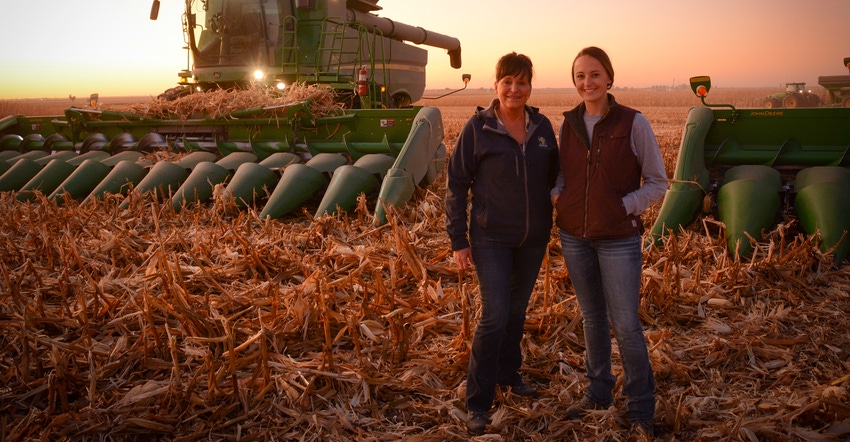May 13, 2021

“Rhonda Musgrave is like a lot of farmers you meet. She worries about waterhemp, her tractors break down, and she doesn’t care for cleaning out grain bins in 90-degree southern Illinois heat — but she does it anyway.”
Sounds familiar, right? That was the start of the story I wrote back in 2004 about Oblong, Ill., farmer Rhonda Musgrave. Nearly 20 years later, not much has changed. She still has the same concerns as every other farmer, no matter their gender.
I called Rhonda this spring, catching her in between planting hitches, because I wanted to talk to her about this anecdotal trend I’d noticed: more young women taking their college degree and coming home to farm. Full time. On purpose. Not for lack of a better option.
Not surprisingly, Rhonda had one of the smartest explanations for the whole thing I’ve seen yet: technology and a generational change in the folks farmers work with. These have made it easier for young women to see themselves as full-time farmers.
If I have a single takeaway following this story, it’s that the farm may be the very definition of a flexible career option — for women and for men.
Farming’s seasons
You’ve got women like Bridjet Blout, Beth and Amy Marcoot, and sisters Lydia Holste and Faith Kemme, who’ve come back to the farm full time and are carving out careers with their parents.
Then you’ve got women who work an off-farm job and farm after hours, hoping to make the farm their full-time job eventually. Women like Kate Huffman and Maria Cox, who were members of our Cultivating Master Farmers program and were very much like their 20-something male counterparts at the time: working the off-farm or side job and working into the farm.
And then there are dozens of other women, like me, Lena Head and Adrienne DeSutter, who have a definite off-farm career but are heavily invested in the farm — both financially and emotionally. We’ll never show up in an ag census and we might not call ourselves farmers by trade. But deep down, we’re farmers, too.
And back to Lydia Holste. Her kids are 9, 4, and 2, with one on the way. She doesn’t load everyone up and run a tractor all day during this season of life. But she will again someday.
What’s in a name
Across generations, we’re seeing a redefinition happening. My mother proudly called herself a farm wife, not a farmer. So does my mother-in-law. But they both ran tractors, kept books, dried grain, helped make financial decisions, marketed grain and raised livestock. Their work was important and beautiful, and they probably didn’t get enough credit for it.
Today’s young women are claiming the title for what they do: farmer. I have such fondness for the farm wife name. But I want to take every young woman who claims the farmer title, wrap her up into a hug, and tell her to go get ‘em.
It’s a different world than it was 40 years ago. Even 20. More daughters are returning to the farm than in the days when they were outright discouraged from farming. One woman shared how 40 years ago when she was making college decisions, the thought of women actively farming was unheard of in central Illinois. Despite working the farm her entire childhood, she had to go a different direction for her career.
Those cultural norms have consequences: her grandfather had 10 granddaughters and zero grandsons. Today, all the family farms are cash-rented, and no family members farm them.
Now, more women are seeing a future on the farm. Not just as a spouse but as the primary farmer. It’s not all roses; another woman tells me she only has one equipment salesman she can trust to not take advantage of her. Others report men trying to rent farms away from them.
Then again, that happens to men, too. So perhaps the playing field is more level than we think.
Back in 2004, that story ended with some wise words from Rhonda Musgrave: “I don’t think it’s as unusual for a daughter to take over as it once was. And hopefully it’ll become more and more common.”
She was right then. She’s still right today. Go get ‘em, young women.
Comments? Email [email protected].
You May Also Like




